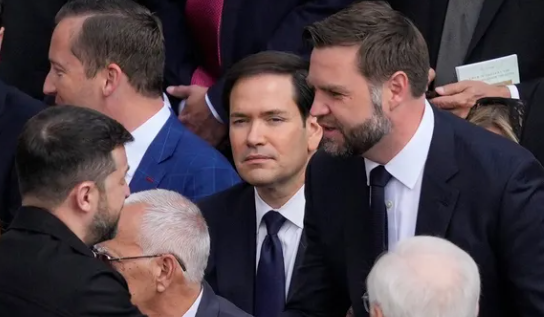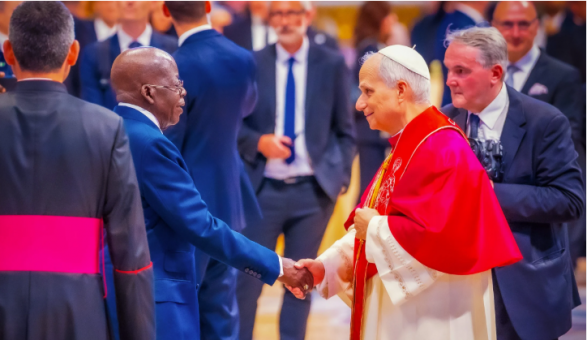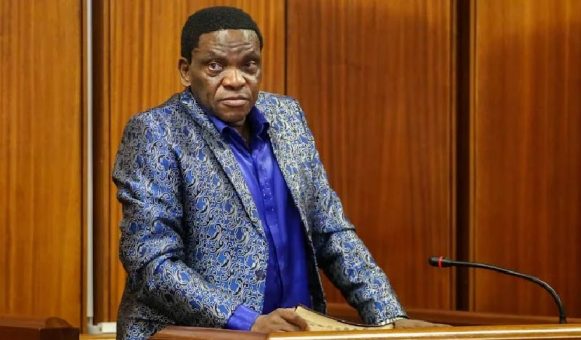
Trump’s Bold Diplomatic Move: Aiming for Ceasefire Amid Russia-Ukraine Conflict

In a bold diplomatic move, President Donald Trump has announced plans to reach out to both Russian President Vladimir Putin and Ukrainian President Volodymyr Zelenskyy as tensions escalate following Russia’s most intense drone strike on Ukraine since the invasion began. Trump, speaking aboard Air Force One while returning from Abu Dhabi to Washington, D.C., declared that achieving peace in Ukraine would require a face-to-face meeting with Putin. The president also revealed plans to speak with NATO leaders, emphasizing the urgency of diplomatic engagement amid the ongoing conflict.
Secretary of State Marco Rubio, while attending Pope Leo XIV’s inaugural mass in Rome, hinted that the Vatican might host a potential peace summit. The Vatican has expressed willingness to facilitate a direct meeting between Ukraine, Russia, and potentially other involved parties, which Rubio described as a promising development. The location is seen as neutral and comfortable for both sides, potentially paving the way for productive dialogue.
The timing of the potential Trump-Putin meeting remains uncertain, but Trump reiterated his determination to personally engage with Putin to break the stalemate. Meanwhile, Rubio has been engaging in diplomatic discussions with Russian Foreign Minister Sergey Lavrov, following a missed meeting between Putin and Zelenskyy in Turkey last week. Though the talks did not yield a comprehensive peace deal, they resulted in a significant humanitarian breakthrough: the exchange of 1,000 prisoners from each side.
Rubio, addressing the media, acknowledged the complexities of the situation, noting that both sides are preparing detailed proposals for a ceasefire. However, he cautioned that the U.S. remains wary of potential stalling tactics from the Russian side. Despite the challenges, Rubio expressed optimism, emphasizing the importance of maintaining a balance between patient diplomacy and the need for tangible progress.
Diplomatic efforts continued as Rubio and Vice President JD Vance met with European leaders, including Italian Prime Minister Giorgia Meloni and European Commission President Ursula von der Leyen, to discuss the broader implications of the conflict. The leaders reiterated their commitment to ending the bloodshed in Ukraine while also addressing trade issues and NATO's role in supporting peace initiatives.
The possibility of a Vatican-hosted summit comes as global powers continue to pressure both Russia and Ukraine to find common ground. Trump’s direct involvement has been framed as essential by Rubio, who stressed that a personal meeting between the two leaders could prove pivotal. As the world watches, the question remains whether Trump’s diplomatic gamble will succeed in bringing both sides to the negotiation table and ending the war.
Amid the political maneuvering, humanitarian concerns remain at the forefront. The exchange of prisoners was welcomed as a positive step, but without a broader ceasefire, the conflict continues to take a devastating toll on civilians. Analysts suggest that the next few days will be crucial in determining whether the proposed talks will lead to lasting peace or further escalate tensions.
Trump’s resolve to directly engage with Putin is seen as a high-stakes strategy that could either solidify his diplomatic credentials or expose the limitations of personal diplomacy in resolving deeply rooted conflicts. While the Vatican remains a potential venue, the complexities of international negotiations and the unpredictable nature of both leaders add uncertainty to the outcome.
As preparations for the potential meeting continue, Rubio emphasized that any agreement must involve realistic concessions from both sides. The Biden administration has remained cautious but supportive of efforts to de-escalate the conflict, with a spokesperson noting that the U.S. government remains committed to diplomatic solutions while also preparing for potential setbacks.
The unfolding situation in Ukraine highlights the intricate balance between diplomacy and strategic pressure. Trump’s willingness to take a direct role signals a break from conventional diplomatic channels, reflecting his preference for personal engagement. Whether this approach will yield peace or falter amid geopolitical complexities remains to be seen, but for now, all eyes are on the potential Trump-Putin summit and the possibility of the Vatican hosting a historic peace dialogue.

